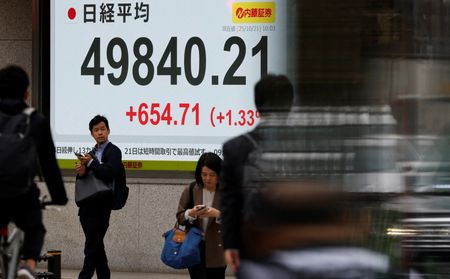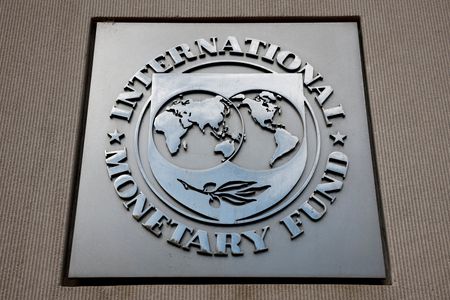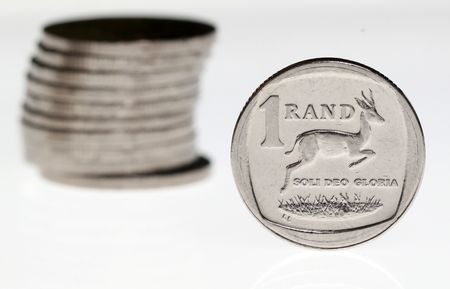By Gregor Stuart Hunter
SINGAPORE (Reuters) -Asian stocks dived on Wednesday and market volatility surged to levels not seen since April after an overnight tech-led selloff on Wall Street put the spotlight on stretched valuations.
Sellers were particularly harsh on both the Japanese and South Korean markets in early trading with Tokyo’s stock index tumbling 4.5%, down almost 7% from a record high reached on Tuesday. South Korean shares plunged as much as 6.2%.
MSCI’s broadest index of Asia-Pacific shares outside Japan was down 2.3%, the most since U.S. President Donald Trump’s Liberation Day tariff announcement in early April. U.S. e-mini futures slumped 0.6% after a 1.2% drop for the S&P 500 overnight.
In Japan, shares in SoftBank Group dived 10% as one of the world’s biggest tech sector investors tracked a 2% drop in the Nasdaq Composite overnight.
“It’s a sea of red across broad markets,” said Chris Weston, head of research at Pepperstone Group in Melbourne. “There aren’t many reasons to buy here, and until we move closer to Nvidia’s earnings on 19 November, the market lacks a short-term catalyst.”
Stocks are retreating from record highs on fears equity markets may have become overstretched after the CEOs of Wall Street heavyweights Morgan Stanley and Goldman Sachs questioned whether sky-high valuations can be sustained.
Last month, banking giant JPMorgan Chase’s CEO Jamie Dimon had warned of a heightened risk of a significant correction in the U.S. stock market within the next six months to two years.
The warnings come as a surge in enthusiasm for generative AI has swept across stock markets worldwide this year, drawing comparisons to the dot-com bubble.
“At some point, profits need to be booked. Especially when we’ve seen repeatedly solid runs to record highs,” said Matt Simpson, senior market analyst at StoneX in Brisbane. “Those with money on the line aren’t likely seeking answers right now – they’re just copying each other like kids in an exam. And the answer is to run.”
Chinese shares dropped, with the CSI 300 falling 0.6% after a private sector gauge of service sector PMI activity expanded at its slowest pace in three months.
The U.S. dollar dropped 0.3% against the yen to 153.16 after the release of minutes from the Bank of Japan’s September policy meeting.
The dollar index, which tracks the greenback against a basket of currencies of other major trading partners, edged back after touching a five-month high of 100.25.
The yield on benchmark 10-year Treasury notes edged lower to 4.058% compared with its U.S. close of 4.091% on Tuesday.
Bitcoin fell below $100,000 for the first time since June and was choppy afterwards, with the cryptocurrency last up 1% at $101,233.90. Gold rebounded after three consecutive days of losses, and was trading 0.2% higher at $3,938.54 per ounce. [GOL/]
The European single currency held steady at $1.1487 after hitting a three-month low following five straight days of declines.
Brent crude was last 0.6% lower at $64.05 per barrel.
(Reporting by Gregor Stuart HunterEditing by Shri Navaratnam)










